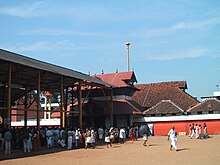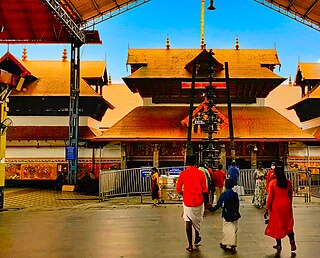
GuruvayurIPA:[guɾuʋɐːjuːr]) is a municipal temple town in Thrissur district, of Kerala State in India. It is a suburban town of Thrissur city, located 26 kilometres (16 mi) from Thrissur towards the north-west. It houses the Guruvayur Shri Krishna Temple. It is located at a distance of 292 km (181 mi) from the state capital Trivandrum towards the north-west, 86 km (53 mi) from Kochi towards the north, 95 km (59 mi) from Calicut towards south.
Guruvayurappan also rendered as Guruvayoorappan, is a form of Vishnu worshipped mainly in Kerala, India. He is the presiding deity of the Guruvayur Temple, who is worshipped as Krishna in his child form, also known as Guruvayur Unnikkannan. The temple is located in the town of Guruvayur, Thrissur, Kerala, which is named after the deity.

Guruvayur Temple is a Hindu temple dedicated to Guruvayurappan, located in the town of Guruvayur in Kerala, India. Administrated by the Guruvayur Devaswom Board, it is one of the most important places of worship for Hindus in Kerala and Tamil Nadu and is often referred to as Bhuloka Vaikunta. The temple is classified among the 108 Abhimana Kshethram of Vaishnavate tradition.

Elephants found in Kerala, the Indian elephants, are one of three recognized subspecies of the Asian elephant. Since 1986, Asian elephants have been listed as endangered by IUCN as the population has declined by at least 50% over the last three generations, estimated to be between 25,600 to 32,750 in the wild. The species is pre-eminently threatened by habitat loss, degradation and fragmentation. Along with a large population of wild elephants, Kerala has more than seven hundred captive elephants. Most of them are owned by temples and individuals. They are used for religious ceremonies in and around the temples, and some churches, and a few elephants work at timber yards.

Mammiyur Mahadeva Temple is a popular Shiva temple situated in Guruvayoor, Thrissur district of Kerala, India. Every devotee who goes to Guruvayur Temple is supposed to go to Mammiyoor also, as the ritual goes. Only Hindus are allowed inside the temple premises. The temple is a part of the 108 famous Shiva temples in Kerala and one among the five Shiva temples around Guruvayoor. The main deity is Lord Shiva, who is installed in the concept of 'Uma Maheshwara' - His form with Goddess Parvathi on his left. There is a shrine for Lord Vishnu also here. The sub-deities are Lord Ganapathi, Lord Subrahmanya, Lord Ayyappan, Goddess Kali and Serpent deities. This temple is managed by Malabar Devaswom Board. Daily three poojas are conducted. Puzhakkara Chennas Mana is the hereditary Thanthri of this temple too. Shivaratri and Ashtami Rohini are the major festivals.
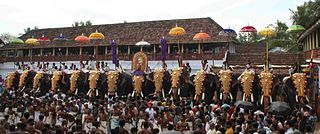
Sree Poornathrayesa temple is a Hindu temple situated in Thrippunithura, Kochi, the capital of the former Kingdom of Cochin, Kerala, India. The temple is considered among the greatest temples in Kerala and was the first among eight royal temples of the erstwhile Kingdom of Cochin. The presiding deity is Vishnu as Santhanagopala Murthy or Poornathrayeesa. He was the national deity of Cochin and protector guardian of Tripunithura. Poornathrayeesa is known for his love of elephants. Hence more than 40 elephants participate in his Vrishchikotsavam.
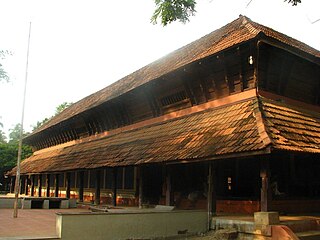
Punnathurkotta is a fort and former palace located in Kottapadi, about 3 km from the Guruvayoor Sree Krishna Temple, in Thrissur District of Kerala State in South India.

Kuzhur is a small village in the southern end of Thrissur district of the Indian state of Kerala. The old Jewish settlement of Mala is the nearest town.

Even though the deity as Rama, in the 'thanthrik' context, believers consider the deity as "Thevar" who participate in fishing pond, in their agriculture activities building check dam for paddy cultivation, who inaugurates seasonal plough of land and so on.

Chavakkad, formerly Chowghat, is a Municipality in Thrissur district of the Indian state of Kerala. Chavakkad is noted for its beach and fishing. It lies on National Highway 66 is located about 83 km (52 mi) north of the city of Kochi, 26 km (16 mi) northwest of Thrissur, and 24 km (15 mi) south of Ponnani.
Punarjani Guha is a 150-metre natural tunnel in a rocky cliff situated in Thiruvilwamala in Thrissur District of Kerala state in southern India. It is located around 2 km southeast of Vilwadrinatha Temple.

Gajarajan Guruvayur Keshavan is perhaps the most famous and celebrated temple elephant in Kerala, India. He was donated to the Guruvayur temple by the royal family of Nilambur on 4 January 1922.
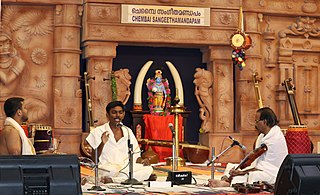
Chembai Sangeetholsavam is an annual Carnatic music festival held in Guruvayur by the Guruvayur Devaswom in memory of Chembai Vaidyanatha Bhagavatar, a Carnatic classical musician and a devotee of Guruvayurappan.

Manapullikavu is a Hindu temple located in Palakkad city, Kerala of India. The temple is most famous for the annual festival that takes place in the temple known as Manappullikavu Vela. Manapullikavu is also a major residential area in Palakkad city comprising apartments and residential colonies. Manappulikavu is ward 27 of Palakkad Municipality.

The Vilwadrinatha Temple is a Hindu temple in Thiruvilwamala, a town in the city of Thrissur, Kerala, India. The principal deities are Rama, the seventh incarnation of the god Vishnu, and his brother, Lakshmana. It figures among the Abhimana Kshetrams in Vaishnavite traditions. This is one of the four major Rama temples in Kerala — the other three are in Thriprayar, Kadavallur, and Thiruvangad. The temple houses an idol of Lakshmana, which is rare in India. Vilwadrinatha Temple is located in the centre of the community of Thiruvilwamala, atop a 100-foot-high hillock. Visible from the temple is Bharathappuzha, the second-largest river in Kerala, which flows past the temple's northern side from around 3 kilometres away.

Sri Vasudevapuram Temple is one of three ancient temples (Maha-Kshetram) on the Southern bank of holy river Bharathapuzha. It sits east of the other two, Maha-Shiva Temple and Brahma temple. These temples along with the famous Thirunavaya Maha-Vishnu temple across the river form the trilogy in Sanatana Dharma). Tavanur is called Muvaankara (മൂവ്വാങ്കര). Brahma, Vishnu, and Shiva are the presiding deities, so it was initially known as Muvalankara, and then Muvaankara. Vasudevapuram Tavanur is situated in the middle of a wooded area resembling that of Sabarimala.

Ettumanoor Mahadeva temple is an ancient Shiva temple in Kottayam, Kerala, India. The temple is one of the major Shiva temples in Kerala, along with Vaikom Temple, Kaduthruthy Mahadeva Temple, Chengannur Mahadeva Temple, Vazhappally Maha Siva Temple, Ernakulam Shiva Temple, Vadakkunathan temple and Sreekanteswaram Mahadeva Temple, Thiruvananthapuram.

Thirumittakode Anchumoorthi Temple is a Hindu temple equally associated with the deities Vishnu and Shiva. Temple is situated on the banks of the Bharathappuzha at Thirumittacode of Palakkad District in Kerala state in India. The five statues - one for Shiva and four Vishnu - are known here as Thirumattikodu five (Anchu) Moorthy Temple.
Peroor Sree Krishna Swamy Temple is a Hindu Temple situated near Ambalamukku in Thiruvananthapuram Municipal Corporation. The temple is dedicated to Krishna and is administered by Travancore Devaswom Board. The town of Peroorkada derives its name from the temple. The temple is also called Thekkan (southern) Guruvayoor.

Pattupurackal Bhagavathy Temple is an ancient Bhadrakali temple located in Njeezhoor village, Kottayam, Kerala. It is the only temple in Njeezhoor village where the presiding deity is present. The Offering of naranga vilakku and neivilakku on Tuesdays and Fridays is very significant to this temple. The nearest towns are Kuravilangad and Kaduthuruthy. It is about 6 km and 11 km away from the temple respectively.The last renovation activities of the temple were done on March 19, 2016, with the presence of Kshetra Thantri Brahma Sree Anil Dhivakaran Namboothiri.The temple is managed by NSS Karayaogam Number 336.
